Nestlé’s regenerative agriculture commitment
Nestlé has announced a climate roadmap to get to net-zero by 2050. What are you doing to make sure everything is on the right track?
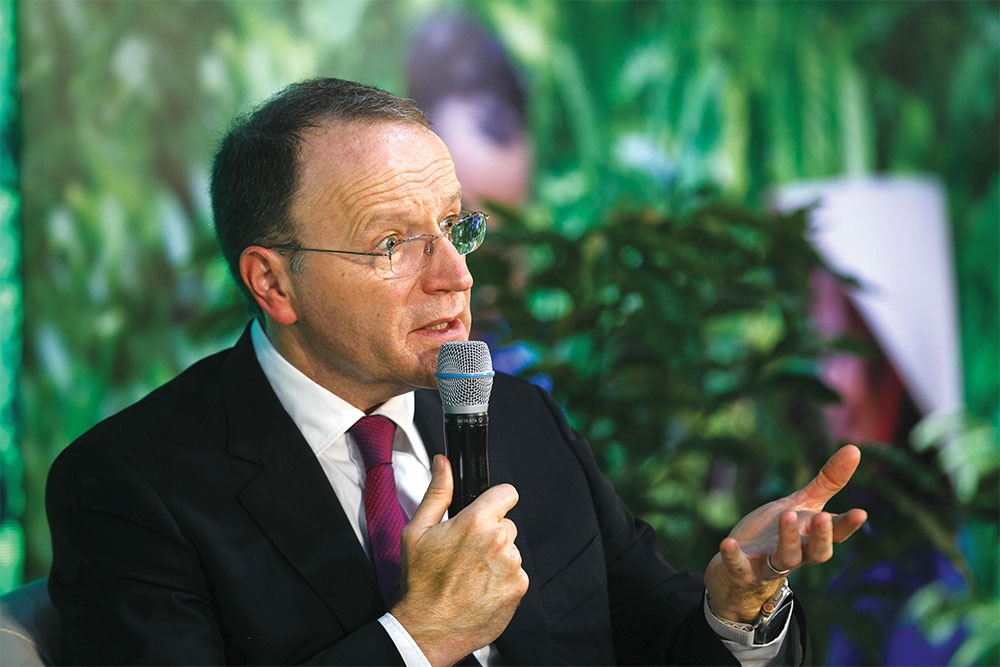 |
| Mark Schneider, CEO of Nestlé Group |
Out of all of our various sustainability initiatives, the one about reducing the emissions of greenhouse gases (GHGs) is probably the most important.
As the world’s largest food and beverage company, Nestlé has a leading role because about one-quarter of the world’s GHGs are related to the production of food and agriculture. We believe that it’s a good thing for us to be a leader and to show how some of these solutions can be developed.
When we set up the plan we were calling for in our company, a reduction of 20 per cent of the GHG by 2025 compared to a based level in the start level in 2018, then 50 per cent by 2030, and then to net-zero by 2050.
This is a very important goal, as we grow we still have to ensure emissions reductions, and we are now on the right track. To achieve this goal, it is not only about words, but actions. Many companies and organisations around the world have made long-term commitments but have not acted enough. We are on the right track to be able to achieve the plans set out.
We have been implementing many activities to hit this target. For example, switching all of our electricity sources and all of our factories, all of our offices around the world to renewable electricity.
Nestlé aims to plant 200 million trees within its sourcing landscapes globally by 2030. The company’s reforestation programme is a key part of its net-zero roadmap.
Why does Nestlé focus on agriculture to deliver sustainability initiatives?
Nestlé has a history of almost 160 years. Our business has been extended to many other countries that produce coffee, cocoa, and so forth. What we see is when working in the agriculture field, it is very different from other industrial products. We work with hundreds of thousands of people around the world. Many of those are families have been doing the same, or similar work, for generations.
Farmers mostly depend on the weather and therefore their cultivation is very risky. Nestlé, therefore, helps farmers to have more sustainable farming with friendly environmental solutions.
Farmers then become our long-term partners and we are happy that we always are trusted by them, and we never leave them alone, even when global market prices are reduced. We are always trying to help them in terms of technical assistance and sometimes also with financial assistance.
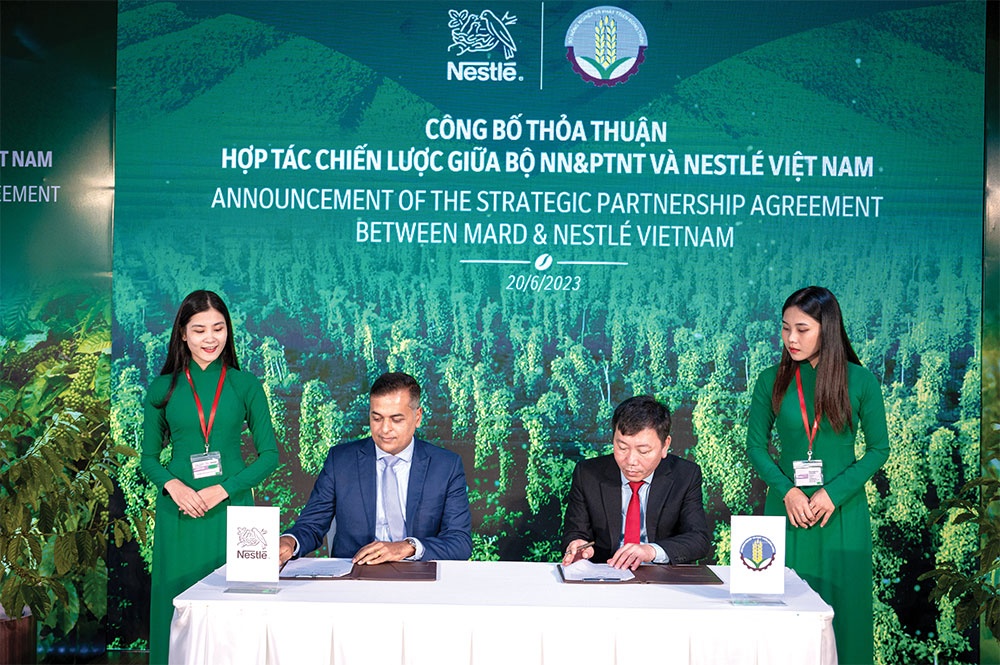 |
| Nguyen Do Anh Tuan (right), director-general of the International Cooperation Department under the Ministry of Agriculture and Rural Development, and Binu Jacob (left), chairman and CEO of Nestlé Vietnam, sign an agreement to support the country’s transition to regenerative and low-emission agriculture |
What challenges does the company face in implementing the planting model in Vietnam?
Farmers around the world are exposed to the natural elements, and so what you see is that farmers tend to be very conservative.
For them, the gap between prospering and losing everything is only one or two crops. So if the previous farming method has been successful, they will want to keep it; they will want to move in the old direction but also not change to a new method for fear of the many risks.
Ten years ago, we brought the Nescafé Plan to farmers by talking about the effectiveness of new methods and better results, but farmers could still do not follow us because they did not believe it. So, our plan is to take small steps and have real examples for them to track.
Finally, there are also those who have changed and succeeded with the new model. We should understand that it is important to have the trust of farmers. Trust built over time is truly rewarding for us. They will maintain that belief for a long time, just like agriculture - it means sustainability.
At Nestlé, we can contribute by bringing science-based advice to farmers. Besides this, we have also contacted many leaders of farmers in the Central Highlands. They are the model of success on their own farm, and they can influence their relatives and family members. When we have leaders and models that have developed with us, it is clear that talking with farmers will be a lot easier.
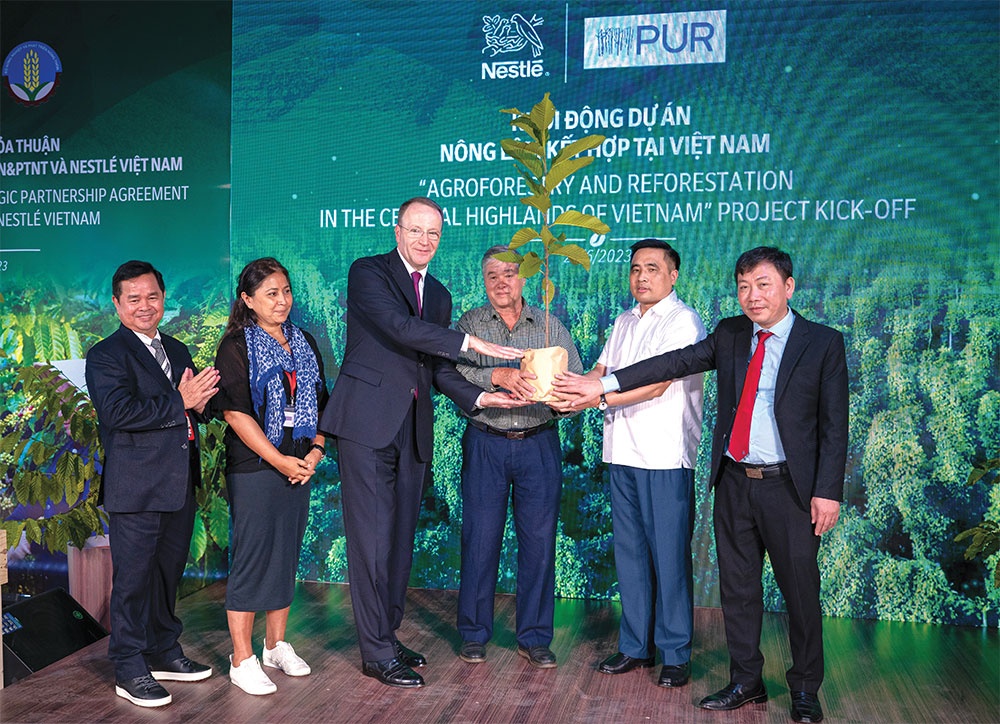 |
| As a key part of its net-zero roadmap and helping to restore Vietnam’s forests and natural ecosystems, Nestlé has kicked off an agroforestry and reforestation project in the Central Highlands region, which targets to plant over 2.3 million forest and fruit trees on coffee farms by 2027 |
What will Nestlé do to make sure the group agroforestry project will be accelerated at scale and sustainably to have a positive environmental impact?
Nestlé has kicked off an agroforestry and reforestation project in the Central Highlands. It aims to plant and grow over 2.3 million forest and fruit trees on coffee farms by 2027. It is estimated that these trees will sequester 480,000 tonnes of CO2 over a 5-year period.
This initiative will help provide additional and more stable incomes to farmers and improve coffee farms’ conditions in the long term. It will make farms more resistant to pests as well as to climatic hazards, including droughts and heavy rains, and will improve soil quality and biodiversity.
Nestlé is determined that the group must become a model for implementing regenerative agriculture. According to the Nescafé Plan 2030, we will buy half of the coffee sourced for Nescafé from regenerative agriculture by 2030.
Currently, we are operating on seven agricultural segments developed from coffee, tea, fruit, agrochemicals, and livestock. Our goal is to share with all other sectors the definition of regenerative agriculture and how to bring about sustainable agriculture in the region.
However, Nestlé alone will not be able to affect the whole of Vietnam, but we need the cooperation of other companies and partners. Vietnam plans to grow one billion new trees in the next five years. The government cannot do this alone, but it needs businesses like us.
Nestlé has contributed 2.3 million trees and hopes that other companies will work with us to implement the plan to plant one billion trees in Vietnam, helping to make the country greener and cleaner.
Our goal is also to bring nutritional products to all socioeconomic classes. We have had many different initiatives carried out by the local government. Collaboration with the local community has put us in a great position, not only moving forward in the Vietnamese market but also in the global market. As we work with communities, we are also working to improve the livelihoods of our stakeholders. We want to be a responsible company to the local community.
Could provide details about the potential of Vietnam’s market and your business plan for it?
We have been in Vietnam for decades and our brands are all very strong. As a leading food and beverage company, Nestlé’s presence in an area with a population of up to 100 million people is critical.
The global economy in 2022-2023 is facing difficulties, but Vietnam’s economy still has positive growth and people’s consumption targets have increased. They are willing to use quality food and drink. And this brings the potential for Nestlé to grow.
So, when we commit to high-quality beverage products, people can immediately see the benefits and solutions that we bring. We aim to bring benefits and help society prosper and develop.
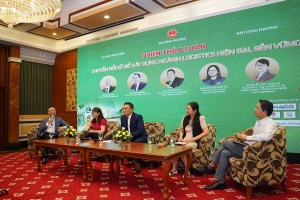 | Nestlé Vietnam focusses on digital transformation throughout its supply chain Nestlé Group is pioneering in the application of digital transformation throughout its logistics activities in the Vietnamese market. |
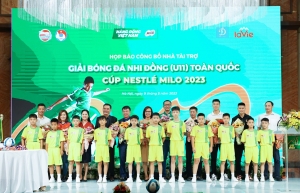 | Nestlé MILO supports National U11 Football Tournament The National Football Tournament for Children (U11) – Nestlé MILO Cup 2023 – began on May 9 in Hanoi, demonstrating Nestlé Vietnam’s commitment to inspiring and nurturing young Vietnamese players and helping them to reach out to both regional and international tournaments. |
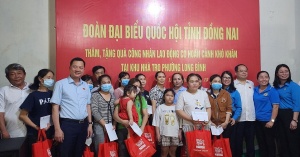 | Nestlé Vietnam supports staff in disadvantaged circumstances In response to Workers' Month 2023, Nestlé Vietnam has granted thousands of gifts to disadvantaged employees in some provinces and cities across the country. |
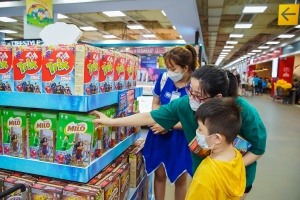 | Nestlé Breakfast Cereal cooperates with Warner Bros to bring joy to children Nestlé Breakfast Cereal has teamed up with Warner Bros to unveil a DC Comics programme that combines images of superhero characters to bring joy to children. |
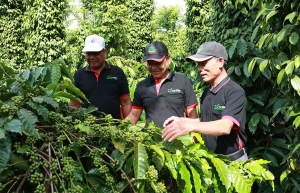 | The transition to a sustainable food system In response to the climate emergency that is exacerbating the global food crisis, companies like Nestlé are making efforts to play a role of game-changers. Chris Hogg, Nestlé’s vice president and head of Sustainability and Communications for Asia, Oceania, and Africa, talked with Van Trang about the transition to a regenerative food system that can nourish the planet affordably and sustainably amid new crisis contexts. |
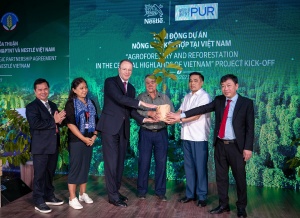 | Nestlé Vietnam strengthens collaborations in sustainable agriculture Nestlé Vietnam has signed an agreement with the Ministry of Agriculture and Rural Development (MARD) to support the country’s transition to regenerative and low-emission agriculture. The new, three-year partnership will help the move to sustainable agriculture and achieve the 'net-zero by 2050' target. |
What the stars mean:
★ Poor ★ ★ Promising ★★★ Good ★★★★ Very good ★★★★★ Exceptional
 Tag:
Tag:
Related Contents
Latest News
More News
- Digital shift reshaping Vietnam’s real estate brokerages (December 31, 2025 | 18:54)
- Allen & Gledhill recognised as Outstanding M&A Advisory Firm (December 18, 2025 | 14:19)
- Inside Lego Manufacturing Vietnam (December 18, 2025 | 11:45)
- The next leap in Cloud AI (December 11, 2025 | 18:19)
- Vietnam’s telecom industry: the next stage of growth (December 11, 2025 | 18:18)
- Five tech predictions for 2026 and beyond: new era of AI (December 11, 2025 | 18:16)
- CONINCO announces new chairman and CEO (December 10, 2025 | 11:00)
- How AWS is powering the next-gen data era (December 09, 2025 | 13:14)
- Outlook in M&A solid for Singapore (December 08, 2025 | 10:31)
- Vietnamese firms are resetting their strategy for global markets (December 05, 2025 | 17:04)






















 Mobile Version
Mobile Version